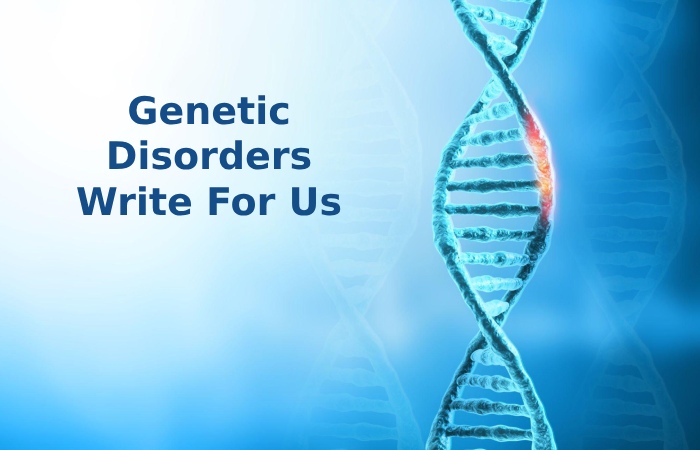Genetic Disorders Write For Us
A genetic disorder is a disease caused in whole or in part by a change in the DNA sequence that differs from the typical sequence. Genetic diseases can be caused by a mutation in one gene, mutations in multiple genes, a combination of genetic mutations and environmental factors, or damage to chromosomes.
As we unlock the secrets of the human genome, we learn that almost all diseases have a genetic component. Some diseases are caused by mutations inherited from parents and present in the individual at birth, such as sickle cell disease. Other diseases are caused by acquired mutations in a gene or group of genes that occur during a person’s lifetime. These mutations are not inherited from parents but occur randomly or due to some environmental exposure. These include many types of cancer as well as some forms of neurofibromatosis.
We welcome contributors who are searching for Genetic Disorders write for us, Genetic Disorders guest post and submit post to write on Healthupp.com.
Description Of Genetic Disorders
- Hereditary genetic disorders are passed down from generation to generation.
- Spontaneous genetic disorders are not passed from one generation to another. Still, they occur when the genetic material in the father’s sperm or mother’s eggs or cells of the developing embryo is damaged by chance or by drugs, chemicals, or other harmful substances (such as X-rays).
- Before becoming pregnant, women and their partners should consult their doctor about the risk of having a child with a genetic disorder.
- Risk factors include an elderly woman (“old”), family history of genetic abnormalities, spontaneous abortions, a previous child with congenital malformations, and chromosomal abnormalities in one of the future parents.
- Tests for genetic diseases can remain done in all couples, especially those at a higher than average risk of having babies.
Several Categories Of Genetic Disorders
Single-Gene Disorders:
Mutations in a single gene cause these and often follow a clear inheritance pattern. Samples contain cystic fibrosis, sickle cell anemia, and Huntington’s disease.
Chromosomal Disorders:
These disorders involve structural or numerical abnormalities in the chromosomes. Examples include Down syndrome (trisomy 21), Turner syndrome (monosomy X), and Klinefelter syndrome (XXY).
Multifactorial Disorders:
A assortment of genetic factors and environmental factors influences these disorders. Examples include heart disease, diabetes, and some forms of cancer.
Mitochondrial Disorders:
These occur due to mutations in the DNA of the mitochondria, which are cellular structures responsible for producing energy. Due to their role in energy production, these disorders can affect various organs and systems.
Polygenic Disorders:
Multiple genes influence these disorders and often have complex inheritance patterns. They include conditions like asthma, obesity, and certain psychiatric disorders.
Genetic Syndromes:
These are a group of symptoms that consistently occur together and are often caused by a specific genetic mutation. Examples include Marfan syndrome and Prader-Willi syndrome.
How to Submit Your Articles?
To submit or write for us, you can email us at contact@healthupp.com
Why Write for Health UPP – Genetic Disorders Write For Us

- Writing for Health UPP can expose your website to customers looking for Genetic Disorders.
- Health UPP presence is on social media, and we will share your article with the Genetic Disorders-related audience.
- You can reach out to Genetic Disorders enthusiasts.
Search Terms Related to Genetic Disorders Write for Us
Genome
Mutation
Gene
Chromosomal
Databases Abnormality
Chromosome
Embryonic Development
Inherited
Autosomal Recessive
Autosomal Dominant
Chromosomal Disorder
Rare
Birth Defects
Developmental
Malaria
X-Linked
Cancer Syndromes
Genomic imprinting
Uniparental disomy
Autosomal
Search Terms for Genetic Disorders Write For Us
Genetic Disorders Write for Us
Write for Us Genetic Disorders
Genetic Disorders Guest Post
Guest Post Genetic Disorders
Genetic Disorders Contribute
Contribute Genetic Disorders
Genetic Disorders Submit Post
Submit Post Genetic Disorders
Genetic Disorders submit an article
Submit an article Genetic Disorders
Genetic Disorders become a guest blogger
A guest blogger Genetic Disorders
Genetic Disorders writers wanted
Wanted writers Genetic Disorders
Genetic Disorders suggest a post
Suggest a post Genetic Disorders
Genetic Disorders guest author
Guest author Genetic Disorders
Article Guidelines on Health UPP – Genetic Disorders Write For Us
- We at Health UPP welcome fresh and unique content related to Genetic Disorders.
- Health UPP allows at least 500+ words related to Genetic Disorders.
- The editorial team of the Health UPP does not encourage promotional content related to Genetic Disorders.
- To publish an article in Health UPP, please email us at contact@healthupp.com
- Health UPP allows articles related to healthcare, wellness, fashion, diet, skin and hair care, fitness, etc.

